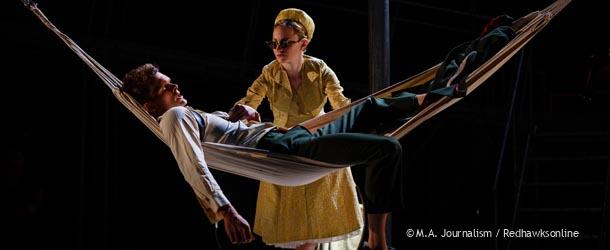Passionate, conflict drive contemporary performance of classic story at Guthrie
Taylor Bye’s review won Third Place in the 2014 Arts Journalism Contest, sponsored by the Minnesota High School Press Association, at the Guthrie Theater in Minneapolis.
Tristan is wounded, shaking with pain and frustration, “Noir ou blanc?! Noir ou blanc!? Black or white?!” he shouts.
“Do you love me?” Spoken in agony these words cut the heart more than any knife could.
Confused? You’re supposed to be, because this ending scene is actually the first you see. Just as Whitehands says, “this is the end and you can’t have an end without a beginning.”
We start in Cornwall, with King Mark, who rules with his head rather than his heart; Tristan, a dashing French stranger; and King Morholt of Ireland, whose murder ends a war between Cornwall and Ireland but starts everything else. Tristan, who killed Morholt, is sent to Ireland by King Mark to bring back Yseult, Morholt’s sister, to be his bride. The mission is a success, or as successful as an arranged marriage by the man who killed the bride’s brother can be. It’s when Tristan is taking Yseult back to Cornwall, where wine and a love potion mix, and drunken mischief turns to kissing mischief and what was supposed to be a simple arranged marriage is turned into a complicated love triangle between Tristan, Yseult and King Mark.

Members of the cast in Kneehigh’s production of Tristan & Yseult. Adapted and directed by Emma Rice. February 13 – March 23, 2014 on the McGuire Proscenium Stage at the Guthrie Theater, Minneapolis. Photo by Steve Tanner.
Kneehigh’s rendition of Tristan and Yseult on the Guthrie’s McGuire Proscenium Stage, which runs through March 23, takes this Cornish legend of old and hurdles it forward a few hundred years to about the late 1960s. Humor comes in the form of transgender roles and the members of the “Club of the Unloved”, which includes Whitehands and men reminiscent of the minions in Despicable Me, with their air of silliness and almost constant presence. The bare-bone set of scaffolding and a circular wood platform, with a few hanging neon signs and circus ropes, provided a simple background allowing the story and music to be the focus. The music was an essential part to this production and it was on the same level of importance as the acting. The music set the mood and gave the setting. It was performed from the top of the scaffolding, and the audience participation prompted by the unique structure made it feel as if you were sitting in an exclusive club, surrounded by friends and being let in on a delicious secret.
The story was portrayed by a small cast of 12 people, with only six having title roles. Giles King and Craig Johnson served as comical relief in their roles as Frocin, King Mark’s assistant, and Morholt first, then Brangian, Yseult’s maid respectively. Stuart Goodwin played King Mark and did a quite accurate job at portraying Mark’s stoicism and then later, despair at love that is not wholly his. Etta Murfitt’s Yseult impressed me the least. Her acting seemed a bit awkward and her passion for Tristan seemed to be forced. I only witnessed her true talent, which she seemed to have been hiding throughout most of the show, at the very end, in the most emotional scene of the play. The two performances I thought made the show were that of Andrew Durand as Tristan, and Carly Bawden as Whitehands. Durand had a quiet grace about him, where every glance, every movement, seemed natural. His longing looks at Yseult were full of passion and fire, even though the rest of his body was relaxed and innate. He never overacted and even though his role was somewhat quiet and brooding, he didn’t underact either. Bawden served as a narrator and overseer for most of the show. She was precise and articulate, without being overdramatic. She had wonderful inflection in her voice and a graceful way of acting that made her character absolutely magnetic.
“Do you love me?” It is quite a loaded question. Either answer could seal one’s fate. These four words are where the whole of the story resides. Does Yseult love Tristan? And if she does, can she also love the king? Does Tristan love Yseult? And if he does, can he also be friends with the king? And what happens to those who are unloved? Are they ever let into the “Club of the Beloved”? Love is a complicated emotion and is a dangerous web to be tangled up in. It can burn red with passion, float white with innocence, and despair black with death. Tristan and Yseult teaches us about all the facets of this complex emotion. It highlights the light and humorous, the passionate and seductive, and the tragic and despairing. Love is not just game, and passion is not just a play, yet this one showed how it may sometimes be both.

